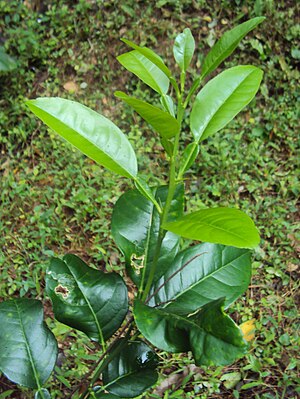Note: This is a project under development. The articles on this wiki are just being initiated and broadly incomplete. You can Help creating new pages.
Difference between revisions of "Citrus aurantifolia"
| Line 1: | Line 1: | ||
[[File:Citrus aurantifolia leaves.jpg|thumb|right]] | [[File:Citrus aurantifolia leaves.jpg|thumb|right]] | ||
| + | '''Lime''' is a small, densely and irregularly branched evergreen tree. It grows up to 5 metres tall. Its twigs are armed with short, stiff, sharp spines. The tree is widely cultivated in tropical and subtropical areas, especially the West Indies, Mexico, Florida, Egypt and southeast Asia, for its edible fruit. | ||
==Uses== | ==Uses== | ||
| − | {{Uses|}}, {{Uses|}}, {{Uses|}}, {{Uses|}}, {{Uses|}}, {{Uses|}}, {{Uses|}}, {{Uses| | + | {{Uses|Fever}}, {{Uses|Diarrhoea}}, {{Uses|Chest colds}}, {{Uses|Fevers}}, {{Uses|Snakebite}}, {{Uses|Cleanse wounds}}, {{Uses|Ground itch}}, {{Uses|Dandruff}}. |
==Parts Used== | ==Parts Used== | ||
| − | {{Parts Used|}}, {{Parts Used| | + | {{Parts Used|Fruit}}, {{Parts Used|Leaves}}. |
==Chemical Composition== | ==Chemical Composition== | ||
| Line 16: | Line 17: | ||
===Dravya=== | ===Dravya=== | ||
===Rasa=== | ===Rasa=== | ||
| − | |||
===Guna=== | ===Guna=== | ||
| Line 29: | Line 29: | ||
==Habit== | ==Habit== | ||
| − | {{Habit|}} | + | {{Habit|Evergreen tree}} |
==Identification== | ==Identification== | ||
| Line 51: | Line 51: | ||
==How to plant/cultivate== | ==How to plant/cultivate== | ||
| − | <ref name="How to plant/cultivate"/> | + | Three main climates are suitable for commercial citrus production - tropical climates, subtropical with winter rain such as in the Mediterranean and semitropical with summer rainfall as found in Florida and southern Brazil<ref name="How to plant/cultivate"/> |
==Commonly seen growing in areas== | ==Commonly seen growing in areas== | ||
Revision as of 13:34, 16 April 2020
Lime is a small, densely and irregularly branched evergreen tree. It grows up to 5 metres tall. Its twigs are armed with short, stiff, sharp spines. The tree is widely cultivated in tropical and subtropical areas, especially the West Indies, Mexico, Florida, Egypt and southeast Asia, for its edible fruit.
Contents
- 1 Uses
- 2 Parts Used
- 3 Chemical Composition
- 4 Common names
- 5 Properties
- 6 Habit
- 7 Identification
- 8 List of Ayurvedic medicine in which the herb is used
- 9 Where to get the saplings
- 10 Mode of Propagation
- 11 How to plant/cultivate
- 12 Commonly seen growing in areas
- 13 Photo Gallery
- 14 References
- 15 External Links
Uses
Fever, Diarrhoea, Chest colds, Fevers, Snakebite, Cleanse wounds, Ground itch, Dandruff.
Parts Used
Chemical Composition
Common names
| Language | Common name |
|---|---|
| Kannada | |
| Hindi | |
| Malayalam | |
| Tamil | |
| Telugu | |
| Marathi | |
| Gujarathi | |
| Punjabi | |
| Kashmiri | |
| Sanskrit | |
| English |
Properties
Reference: Dravya - Substance, Rasa - Taste, Guna - Qualities, Veerya - Potency, Vipaka - Post-digesion effect, Karma - Pharmacological activity, Prabhava - Therepeutics.
Dravya
Rasa
Guna
Veerya
Vipaka
Karma
Prabhava
Habit
Identification
Leaf
| Kind | Shape | Feature |
|---|---|---|
Flower
| Type | Size | Color and composition | Stamen | More information |
|---|---|---|---|---|
| {{{5}}} |
Fruit
| Type | Size | Mass | Appearance | Seeds | More information |
|---|---|---|---|---|---|
Other features
List of Ayurvedic medicine in which the herb is used
Where to get the saplings
Mode of Propagation
[[:Category:Index of Plants which can be propagated by |]]
How to plant/cultivate
Three main climates are suitable for commercial citrus production - tropical climates, subtropical with winter rain such as in the Mediterranean and semitropical with summer rainfall as found in Florida and southern Brazil[3]
Commonly seen growing in areas
[[:Category:Herbs that are commonly seen in the region of |]], [[:Category:Herbs that are commonly seen in the region of |]], [[:Category:Herbs that are commonly seen in the region of |]], [[:Category:Herbs that are commonly seen in the region of |]], [[:Category:Herbs that are commonly seen in the region of |]].
Photo Gallery
References
Cite error: <ref> tag with name "Uses" defined in <references> is not used in prior text.
External Links
- [ ]
- [ ]
- [ ]
- Pages with reference errors
- Ayurvedic Herbs known to be helpful to treat Fever
- Ayurvedic Herbs known to be helpful to treat Diarrhoea
- Ayurvedic Herbs known to be helpful to treat Chest colds
- Ayurvedic Herbs known to be helpful to treat Fevers
- Ayurvedic Herbs known to be helpful to treat Snakebite
- Ayurvedic Herbs known to be helpful to treat Cleanse wounds
- Ayurvedic Herbs known to be helpful to treat Ground itch
- Ayurvedic Herbs known to be helpful to treat Dandruff
- Herbs with Fruit used in medicine
- Herbs with Leaves used in medicine
- Habit - Evergreen tree
- Index of Plants which can be propagated by
- Herbs that are commonly seen in the region of
- Herbs
- Pages without herbs images



